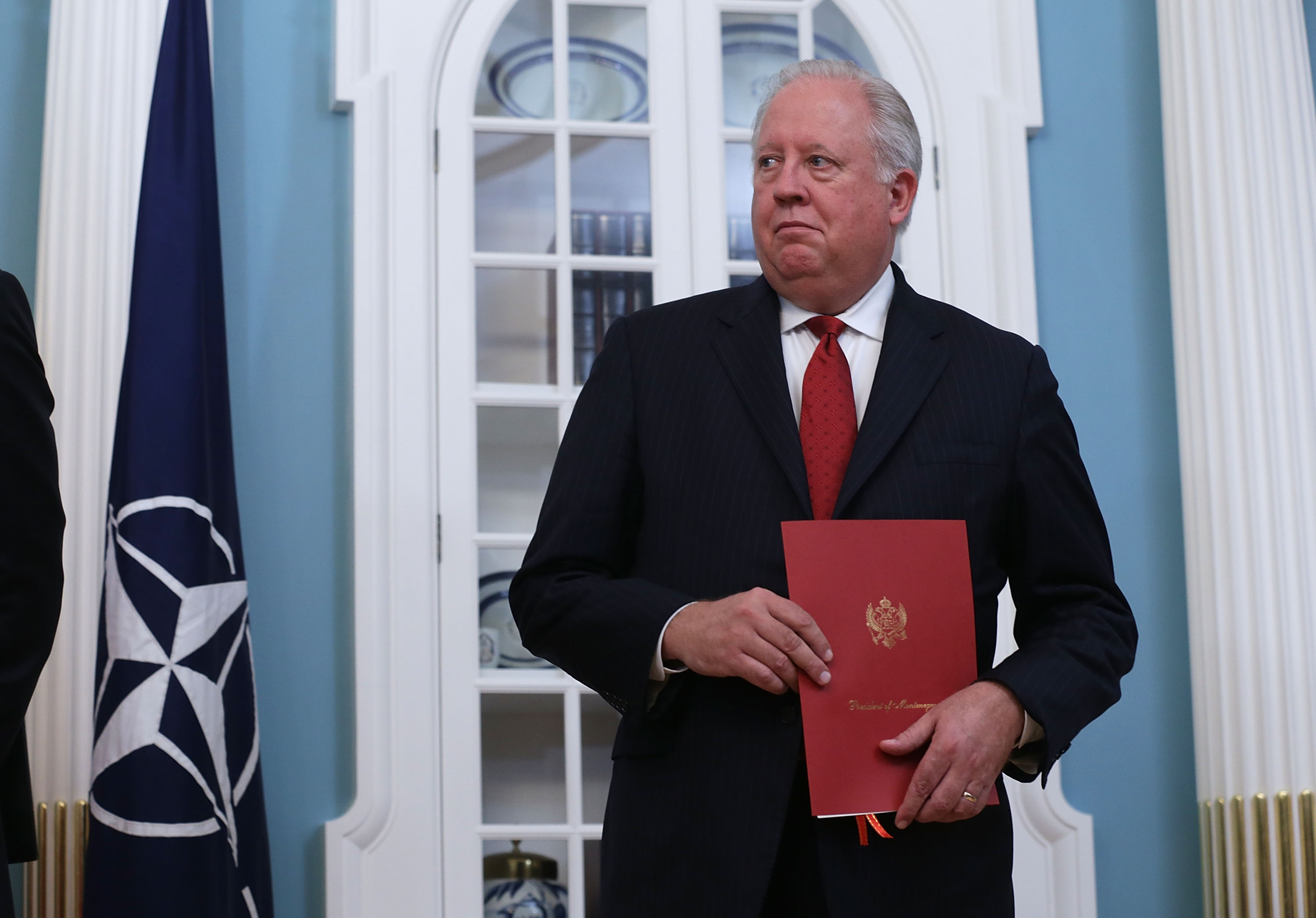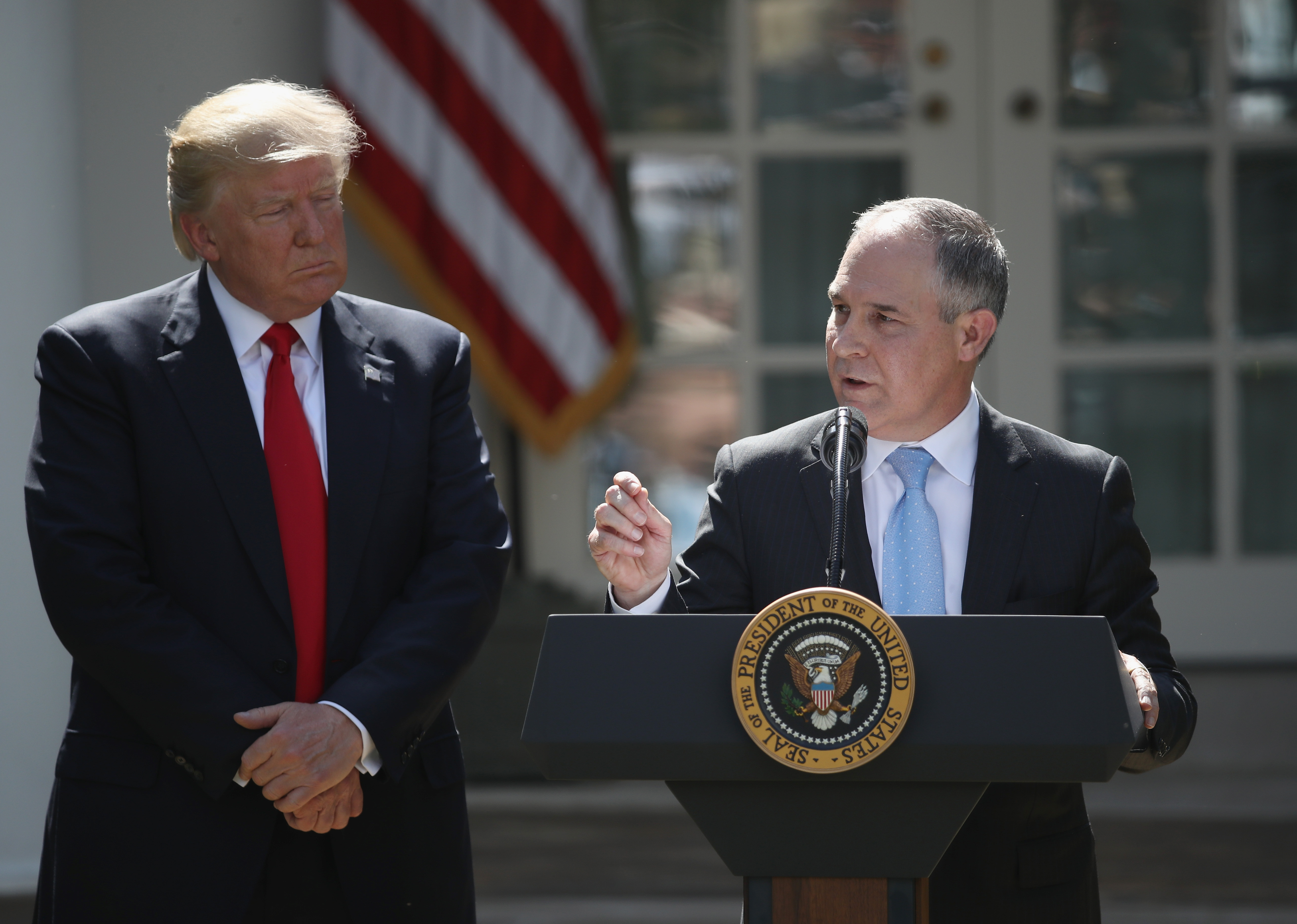

(Photo: Alex Wong/Getty Images)
At the COP23 climate summit in Bonn, Germany, a small cast of diplomats representing the United States will find themselves in a supremely awkward spot: negotiating a deal their president has already walked away from.
It’s all the more fraught given that their country led the way in drafting the agreement that it’s now retreating from—and remains one of the world’s top emitters of carbon dioxide.
Yet that’s precisely the reality awaiting U.S. negotiators this coming Monday, when the nearly 200 signatories to the Paris climate agreement descend on Bonn for the annual United Nations climate talks.
“There’s no question that the change in direction from the White House with regard to climate change dramatically hampers the ability of negotiators to push forward,” says Christy Goldfuss, who served as managing director of the White House’s Council on Environmental Quality under President Barack Obama.
“It’s very difficult to have the credibility you need in these types of international negotiations when it’s clear you’re not going to be making the same sacrifice or stepping up in the same way other countries will be,” she adds.
Welcome to this year’s round of global climate talks, where the Trump administration is poised to put forward two diametrically opposed faces.
On the one hand, we have an American delegation led by the Department of State’s Thomas A. Shannon, a respected career diplomat who once called mitigating the effects of climate change “one of the world’s great challenges.”
On the other, we have the president’s open hostility to the science of climate change and all international efforts to combat it. Even before he announced his intent to withdraw from the Paris Agreement last spring, Trump had dubbed climate change a “hoax” perpetrated by the Chinese, appointed the former head of ExxonMobile to be his top diplomat, and plucked a staunch ally of the oil and gas industry to head his Environmental Protection Agency.
After Nicaragua signaled its intention to join the agreement last week, the president’s only remaining company in boycotting the Paris Agreement is Syria’s Bashar al-Assad, whom Trump himself has referred to as an “evil person” and an “animal.”
By design, the Paris Agreement is built around five-year review cycles, and this year’s two-week session, COP23, was supposed to be a relatively low-stakes technical one, focused largely on reviewing transparency measures and fleshing out guidance for countries working to meet their climate goals, a process expected to be completed next year.
But the political backdrop threatens to overshadow any substance.
A Skeleton Crew From the Department of State
Already the White House’s muddled commitment to the process is clear.
Even before the president announced U.S. withdrawal from the agreement, the American team of negotiators at the traditional mid-year “intercessional” U.N. climate talks was a skeleton of its former self. Next week’s team is expected to be similarly bare-bones. And, for the first time in recent memory, the Department of State hasn’t scheduled a briefing ahead of the climate talks, at least so far. A Department of State spokeswoman declined to comment about details of the American delegation for this story, noting that the line-up has not been finalized.
Jonathan Pershing, who served last year as the lead U.S. negotiator and special envoy for climate change, says this year’s talks could go one of two ways. Either Shannon could be allowed to operate behind the scenes, playing a relatively quiet, low-profile role—or else other administration officials could swoop in and blow things up. “There could be fireworks,” he says. “But that would be a disappointment.”
One such explosive display could come in the form of a visit from the EPA’s Scott Pruitt, who enthusiastically encouraged the president to exit the Paris Agreement; more recently, he has signaled an ongoing appetite for public fights over climate science. Pruitt might still participate in talks in some capacity. The EPA did not respond to a request for comment on his travel plans.
What COP23 Can Achieve
At their best, negotiations at COP23 will help pave the way for next year’s talks in Poland, when countries will take stock of the progress since Paris, and, after that, a session in 2020, where countries will review their own voluntary contributions to the agreement and consider upping the ante.
Meanwhile, though, the environmental advocates who’ve dedicated their lives to fighting climate change already have a message. “I call this is the ‘put up or shut up COP,'” says Alden Meyer of the Union of Concerned Scientists, who has been to every COP but one since the U.N. Framework Convention on Climate Change started holding them more than 20 years ago.
“We had a great reaction from leaders around the world universally saying they wouldn’t follow Trump out the door on Paris,” Meyer adds. “But this COP is the one where they really have to start giving meaning to that rhetoric.”
Though it will physically take place in Bonn, the conference is technically being hosted by Fiji. It’s the first time an island nation has played that role, and Fiji’s centrality promises to put a spotlight on the needs of low-lying areas most vulnerable to the storms and sea-level rise associated with climate change.

(Photo: Win McNamee/Getty Images)
COP23 also comes as the U.S. is being ravaged by wildfires in the West and an unusually destructive hurricane season in the South; a new federal study found that American taxpayers spend billions every year on disaster relief for climate-related extreme weather.
Such context at home might seem like reason to hope Trump would make a different decision, that he could eventually come around to the notion that global climate solutions are worth working on. And, for a long time, many on the international stage were waiting for that.
The Myth of the Trump “Pivot”
When Trump’s election took the world by surprise in the middle of climate talks in Morocco last year, the diplomatic community seemed to be engaged in a sort of collective breath-holding, as they hoped against hope, and really all available evidence, that the man who once promised to “cancel” Paris would somehow reverse course.
As one environmental minister in Marrakech put it to me at the time: “We have heard the candidate. Today we have to listen to the president.”
But in the days and months that followed, nothing, from the U.N. secretary-general’s beseeching phone call to Al Gore’s courting of Ivanka Trump, changed Trump’s well-established views: By Vox’s best count, the president tweeted his climate change skepticism 115 times before ever running for office.
A year out, the myth of the transformational powers of the presidency on its occupant has been shown to be just that—a myth—and, increasingly, it’s felt to be one that politicians at every level must dispense with.
To wit, when California state senate leader Kevin De León recently announced his intent to challenge sitting U.S. Senator Dianne Feinstein for her seat, the one reason he gave for opposing her was she had seemed to buy into the Trump transformation myth. (As Jeff Flake put it in announcing his retirement from the Senate this week, “If we are waiting for a pivot, we ought to quit waiting.”)
De León, who has made climate central to his work in the state legislature and was an outspoken figure in Paris in 2015, will appear at climate talks next month as part of what’s expected to be a robust showing from sub-national groups.
In a way, it’s as if the U.S. will be represented twice, and by groups with two vastly different agendas: California Governor Jerry Brown has already been appointed by the Fijian Prime Minister to represent sub-national jurisdictions committing to climate action, and the U.S. pavilion—which the Trump administration declined to pay for this year—will be financed by (and will showcase the contributions of) U.S. sub-national actors.
Not wanting to be entirely marginalized, the Department of State has, for months, been doing a funny two-step, with officials forever dangling the possibility that Trump might embrace the agreement if more favorable terms for the U.S. could be reached.
Though the U.S. can’t formally leave the accord until 2020, this idea reeks of transformation-myth logic and ignores the fact that Trump already walked away from the table.
“Had he stayed in, he could have negotiated,” says Goldfuss, now vice president for energy and environmental policy at the Center for American Progress. “By withdrawing, there’s no mechanism by which he can negotiate.”
Moving Ahead Without Trump
Even if Trump did want to come back to the table, few are waiting around for any such thing any longer.
David Waskow, director of the World Resource Institute’s International Climate Initiative, said that, ever since Trump’s speech announcing withdrawal, it’s been “totally unclear” what his conditions for staying in the agreement would even be. “Nobody should assume that there might be something that could be offered to do that,” Waskow says.
Taking Trump at face value, however, presents problems of its own: Without a U.S. commitment, other international actors might feel empowered to back out on their commitments too.
So far, at least, they haven’t.
In fact, if anything, Trump’s tough talk seems to have spurred a backlash among those in the international community, galvanizing other countries into action: China has been taking an increasingly active role, France has announced its own ancillary climate summit, and Germany has re-elected Angela “The Climate Chancellor” Merkel.
Pershing, now a program director at the William and Flora Hewlett Foundation, has a theory for why other countries are pushing ahead, even without the U.S.
“It’s because they think this is where the future is going to go,” he reasons, “and Trump in that agenda is largely incidental.”





